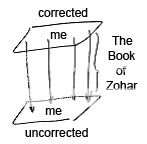Tune Into The Light That’s In The Zohar
Question from a
Student: How
can I tune into the Light that Reforms while studying The Zohar?
Dr. Laitman's
Answer: The Light that Reforms is the force of bestowal that comes from Above and
builds qualities of bestowal above our will to receive. But how can we attract
this force if we are just egoistically thinking about wanting to bestow? This
will not help. Instead, we have to tune into the system that influences us.
Our soul has to
receive the influence of the Surrounding Light. This is why we were given The Book
of Zohar, which tells us all kinds of stories about a donkey and a snake,
different nations, three lines, Zeir Anpin and Malchut, the
Temple, and many other things. I don't know what desire I am working on now and
whether I have the right intention, but while I am reading The Zohar with the right mindset, it operates as a connecting system between my soul and
the Upper System.
There exists an
Upper System wherein my soul is already included in a fully corrected state;
meanwhile, my uncorrected soul is below. These two systems have an identical
structure. The only difference between them is the use of the desire, meaning
the intention, which determines how the desire is used. As I correct my desire,
my soul will expand, starting from a point, and new, concealed desires will
surface. But I need a mechanism to connect me and these two states.

The Book of Zohar functions as this
connecting link. When I read it correctly, I reveal this connection. All I have
to do is try to imagine myself in the corrected form. I have to tune into the
text and start living inside it. I have to desire for it to "clothe" over me so
I will become the protagonist of everything being described there. It is
talking only about me and my inner battle with my corrupted self, where I am
fighting for a chance to be similar to the Creator. All the qualities and
characters are me; it is all inside of me.
If this is how I
prepare for reading The Zohar, then I will proactively attract the
Surrounding Light to myself.
Only The Light Provides All The Answers
Question from a
Student: What
should we think about while reading The Book of Zohar in order to be
more sensitive to it?
Dr. Laitman's
Answer: I
actually don't have the answers to any of your questions, because all the
answers are provided by the Light that Reforms. My job is only to try and
direct you toward this Light.
Some people ask me
about sensation, wondering, "Where can I get more of it?" Others ask about the
mind, "When should or shouldn't I use it?" Other people ask me questions like,
"When will I start to see and feel everything we study? Why do I feel one way
now and later I feel differently?" The answer is that I don't have the answers
to these questions-and I shouldn't have them, either. An answer is a
manifestation of the Light inside a person; it is one's corrected state which
stands opposite the question, one's previous, uncorrected state.
A person should
have just one concern, "Am I directed toward the ray of Light called the Light
that Reforms, so it will shine on me?" One shouldn't think about fulfilling
one's sensation and mind with answers to any other questions besides that one
question about the Light that Reforms. Incidentally, this is why Baal HaSulam
was laughing at the "Kabbalists of Jerusalem" who knew The Book of Zohar by heart, but rejected its inner essence.
The only thing one
should store in one's memory is the basic concepts of the science of Kabbalah,
because they direct a person toward bestowal, giving him the correct, spiritual
interpretation of the words. They elucidate the goal and direct a person toward
it. If a person is studying correctly, then he will receive answers to all his
questions, both in the sensation and the mind. He will advance and understand
what is happening, and eventually he will be satisfied by this. He will see how
he is advancing day by day.
We are now studying
The Book of Zohar intensively. If a person tries to prepare for the
lesson and to seriously participate in it, then in a very short while he is
bound to feel qualitative changes happening inside him. He will become more
sensitive to his connection with others and will feel a change in his attitude
to the environment, the studies, the quality of bestowal, and the Creator. But
he has to become more sensitive in order to discern what is useful and what
isn't.
All of this takes
place as a result of the study. Besides this, there is nothing for us to work
on. This is why I always talk just about the intention: What exactly do we want
from the study, and what it should give us?

 Kabbalah International
Kabbalah International